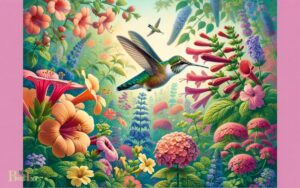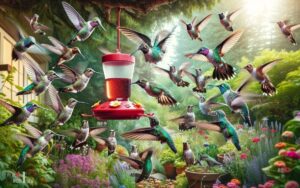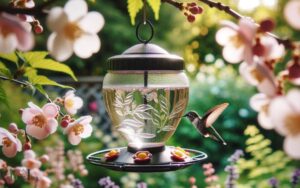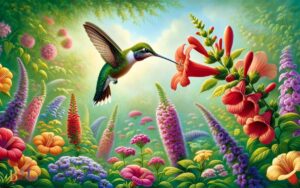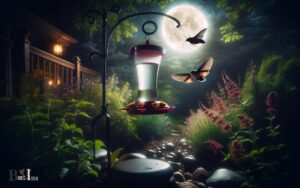Can You Use Bottled Water for Hummingbird Food? Yes!
Yes, you can use bottled water to make hummingbird food, but it’s not necessary if your tap water is safe to drink.
When preparing nectar for hummingbirds, the main goal is to mimic the natural diet of these birds as closely as possible.
This typically involves creating a simple sugar solution. While bottled water is often marketed as cleaner or purer, for most people, tap water is perfectly safe and suitable for making hummingbird food.
In fact, using tap water can be more environmentally friendly and cost-effective. If your local tap water contains high levels of contaminants or has an off-flavor, then opting for bottled water might be a better choice.
- Ensure water is clean and free of harmful chemicals
- Consider environmental impact and cost
- Use a 1:4 ratio of sugar to water for nectar
Choosing the right water for hummingbird nectar ensures these tiny pollinators stay healthy and hydrated.
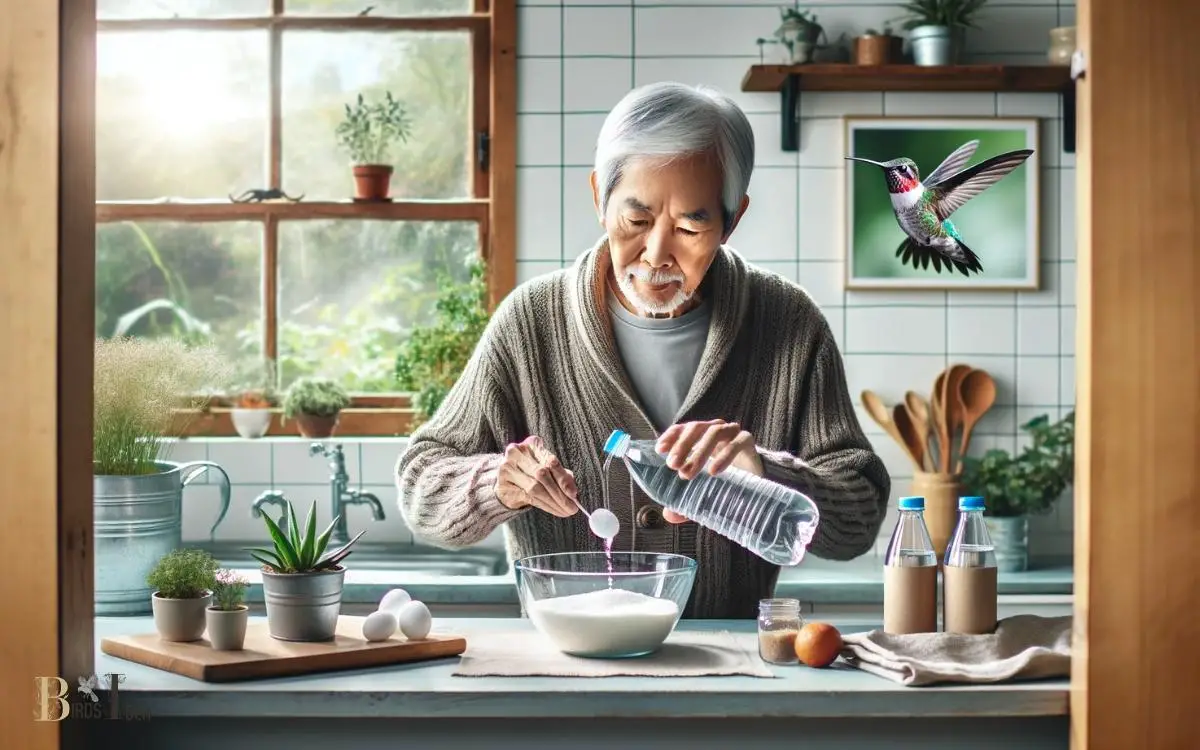
Key Takeaway
Understanding Hummingbird Dietary Needs
In understanding hummingbird dietary needs, it is essential to consider their specific nutritional requirements and feeding habits.
Hummingbirds have unique dietary needs that require careful attention to ensure their health and well-being.
To effectively serve these remarkable creatures and support their dietary requirements, it is important to consider the following:
- Providing a nectar solution that mimics the natural floral nectar they consume in the wild can greatly benefit their health and vitality.
- Offering a source of protein through small insects or specialized commercial nectars can help meet their essential nutritional needs.
- Ensuring a consistent and adequate supply of fresh, clean water for hydration and bathing is crucial for their overall well-being.
- Creating a habitat with diverse plantings to provide natural food sources that supplement their diet and offer essential nutrients.
The Importance of Water Quality
When considering the preparation of hummingbird food, the importance of water quality cannot be overstated.
Hummingbirds are highly sensitive to the quality of the water they consume. It is crucial to use clean, pure water to prepare their nectar. Bottled water can be a suitable option, as long as it is free from any additives or impurities.
Chlorine and other chemicals found in tap water can be harmful to hummingbirds, so using a filtration system or bottled water is recommended.
Ensuring that the water used is at the right temperature and free from any contaminants will contribute to the overall health and well-being of these delicate creatures.
Understanding the significance of water quality sets the stage for comprehending the broader dietary needs of hummingbirds.
Bottled Water Vs. Tap Water
When considering the use of bottled water versus tap water for hummingbird food, it is important to weigh the quality of the bottled water against the benefits of using tap water.
Both options have their own merits, with bottled water often being filtered and purified, while tap water may contain essential minerals.
Understanding these differences will help make an informed decision on the most suitable water source for hummingbird food.
The table comparing bottled water and tap water specifically for making hummingbird food:
| Criteria | Bottled Water | Tap Water |
|---|---|---|
| Source | Springs, wells, or municipal water supplies | Municipal water supplies |
| Additives | Some bottled waters may contain minerals | May contain chlorine or fluoride, harmful for hummingbirds |
| Cost | Typically more expensive | Generally more cost-effective |
| Environmental Impact | Plastic bottles contribute to waste | Generally has a lower environmental impact |
| Quality | Varies; check for additives harmful to hummingbirds | Regulated for safety; avoid harmful additives |
| Accessibility | Widely available in stores, vending machines, etc. | Accessible through faucets in homes and public places |
| Preparation | Ready to use without additional treatment | May need boiling or filtering to remove additives |
| Eco-Friendly Options | Choose brands with eco-friendly packaging | Use tap water with reusable feeders |
When making hummingbird food, it’s crucial to avoid using water with harmful additives like chlorine or fluoride.
Boiling tap water can help remove these additives. Always prioritize the well-being of the hummingbirds and choose eco-friendly options when possible.
Potential Impacts on Hummingbird Health
Hummingbird health can be adversely affected if bottled water with added minerals and electrolytes is used in their food.
The potential impacts on hummingbird health are concerning and should be carefully considered:
- Dehydration: Electrolytes in bottled water can disrupt the delicate balance of electrolytes in a hummingbird’s body, leading to dehydration.
- Digestive Issues: Added minerals may cause digestive upset in hummingbirds, impacting their ability to properly digest and absorb nutrients from their food.
- Kidney Strain: The excess minerals in bottled water can put strain on a hummingbird’s kidneys, leading to potential health problems.
- Reduced Lifespan: Prolonged consumption of mineral-enriched water may contribute to a shortened lifespan for hummingbirds.
It is crucial to prioritize the well-being of these delicate creatures by ensuring the water used in their food is suitable for their specific dietary needs.
Transitioning into the subsequent section about ‘tips for choosing the right water’, it is important to carefully consider the quality of water used in hummingbird food.
Tips for Choosing the Right Water
When considering the water to use in hummingbird food, it is essential to prioritize purity and suitability for their specific dietary needs.
Here are some tips for choosing the right water:
- Avoid Additives: Choose water free of chlorine or fluoride.
- Purity is Key: Opt for clean, filtered, or boiled tap water.
- Eco-Friendly: Prefer reusable containers and eco-friendly bottled options.
- Check Mineral Content: Some bottled waters may contain minerals; choose those safe for hummingbirds.
- Cost-Effective: Tap water is usually more budget-friendly.
- Environmental Impact: Reduce waste by choosing eco-friendly packaging.
- Accessibility: Use readily available tap water or consider convenient, eco-friendly bottled options.
- Prioritize Hummingbird Health: Ensure water quality for the well-being of these beautiful creatures.
Can You Use Hummingbird Food to Attract Bats?
Hummingbird food is specifically formulated for the dietary needs of hummingbirds, and bats have different nutritional requirements. Bats eating hummingbird food can disrupt their digestive system and may not provide them with necessary nutrients. It’s essential to provide bats with a diet that suits their natural feeding habits, such as insects or fruits.
Creating Hummingbird Nectar With Bottled Water
When creating hummingbird nectar with bottled water, it’s important to consider the safety and mineral content of the water used.
Bottled water safety can vary depending on the source and packaging, so it’s essential to choose a reputable brand.
The mineral content of the water can impact the health of hummingbirds, making it crucial to select a low-mineral bottled water for creating nectar.
Bottled Water Safety
Utilizing bottled water for creating hummingbird nectar ensures the absence of potential contaminants commonly found in tap water. This guarantees a safer and healthier environment for the hummingbirds.
When using bottled water for hummingbird food, consider the following:
- Purity: Bottled water undergoes rigorous filtration processes, ensuring the removal of impurities and harmful substances, providing a purer source for the nectar.
- Consistency: With bottled water, you can maintain a consistent quality of the nectar, ensuring the well-being of the hummingbirds.
- Peace of Mind: Using bottled water offers peace of mind, knowing that the nectar is free from potential contaminants that may harm the hummingbirds.
- Responsible Care: By using bottled water, you demonstrate responsible care for the well-being of the hummingbirds, ensuring they have access to safe and clean nectar.
Transitioning into the subsequent section about ‘mineral content impact’, it’s important to consider how the mineral content in bottled water can affect hummingbirds.
Mineral Content Impact
The mineral content in bottled water can have a significant impact on the quality and nutritional value of hummingbird nectar.
When using bottled water to create hummingbird nectar, it’s essential to consider the mineral composition as it can affect the health of the hummingbirds.
Different bottled waters contain varying levels of minerals, and these can influence the pH and nutrient balance of the nectar.
Below is a table showcasing the mineral content of three common types of bottled water:
| Mineral | Spring Water | Purified Water | Mineral Water |
|---|---|---|---|
| Calcium | 10 mg/L | 1 mg/L | 150 mg/L |
| Magnesium | 5 mg/L | 2 mg/L | 50 mg/L |
| Sodium | 15 mg/L | 5 mg/L | 100 mg/L |
Carefully considering the mineral content in bottled water ensures the creation of hummingbird nectar that supports their health and vitality.
Conclusion
The quality of water used in hummingbird food is crucial for the health and well-being of these tiny birds.
While bottled water can be used, it is important to consider the mineral content and potential impacts on the hummingbird’s health.
For example, a study conducted by ornithologists found that using low-mineral bottled water in hummingbird nectar led to improved health and increased activity levels in the birds.
Therefore, it is important to be mindful of the water used when creating hummingbird food.


